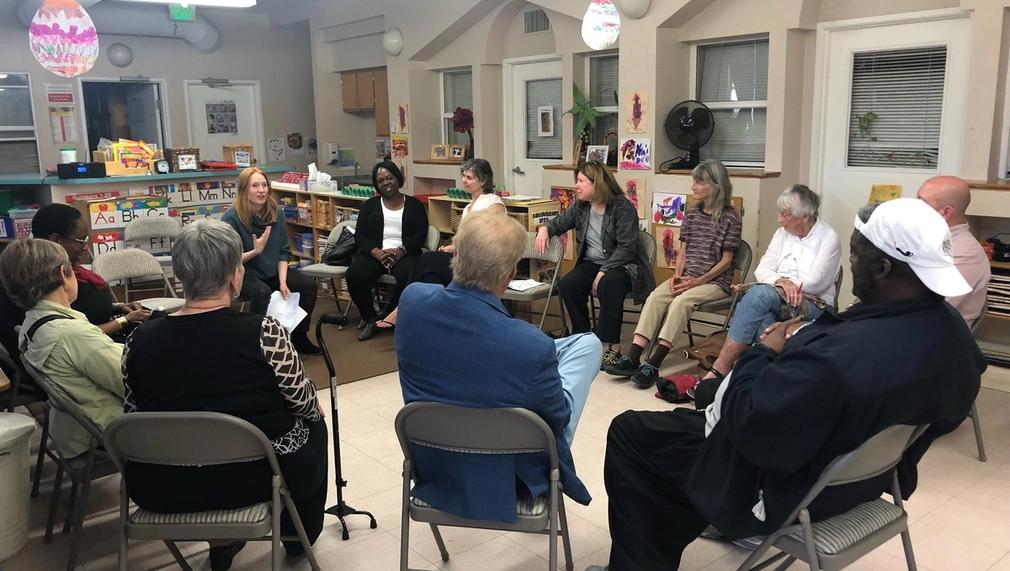Democracy Dialogues
Amid a global rise in anti-democratic pressures, LA County communities, schools and institutions are threatened by polarization, and US based democratic institutions are under daily attack. We know that it takes people power to uphold fragile democratic systems, and we are responding to the call to protect them by launching virtual and in person educational dialogues that promote empathy and constructive conversations across divides, facing systemic and political issues together with curiosity, empathy and personal commitments to action.

What is the primary issue area that your application will impact?
Adult literacy
In which areas of Los Angeles will you be directly working?
County of Los Angeles (select only if your project has a countywide benefit)
In what stage of innovation is this project, program, or initiative?
Pilot or new project, program, or initiative (testing or implementing a new idea)
What is your understanding of the issue that you are seeking to address?
While there are myriad examples of approaches to developing a more informed and inclusive public, we have found that offerings related to democracy and dialogue often confuse “dialogue” with discussion or debate. Many existing dialogues involve panels of experts rather than grassroots community engagement that lead to increased civic engagement. In addition, in piloting the democracy dialogues, we have learned that people have very different definitions about what dialogue is and who is responsible. UHRI's approach to democracy dialogues will require educational elements, to develop shared contextual understanding and definitions. To this extent, we offer pathways away from polarization toward communication that is grounded in curiosity rather than debate. It centers people’s personal experiences without shying from deeply nuanced conversations about systemic and political issues, and it culminates in specific and personal commitments to getting engaged in one's community.
Describe the project, program, or initiative this grant will support to address the issue.
UHRI has offered intergroup dialogue services in LA County for nearly a decade. We provide tools for engaging across differences and building deeper connections and knowledge. We use a research-based four-stage model developed at the University of Michigan and UCLA, among other institutions, and have conducted our own published research in the Los Angeles region. UHRI has fostered a partnership with the Demos Project, an Erasmus funded program offering educational dialogues on democracy in community settings across Europe. As early advisors, UHRI has access to their facilitation and educational materials, and our team of intergroup dialogue facilitators and researchers have expertise implementing dialogue in a wide range of settings, strengthening interpersonal connections that transcend political, economic, racial/ethnic and gender lines.
We have already collected data on US based perspectives on Democracy and have the materials and structure for the Democracy Dialogues in place. Our team of community facilitators across the county are eager to get started, with the first cohort to be trained on July 1, 2025. We will then launch community-based dialogues across the county over the Fall. We are seeking funding to aid us in this implemenation. In order to scale, after launching the first 10 democracy dialogues, UHRI will offer online tools and training for anyone interested, with a goal of scaling to at least 30 or more dialogues throughout the county.
Describe how Los Angeles County will be different if your work is successful.
Our data shows LA County residents are concerned for the future of democratic systems. We aim to connect with residents to explore their understanding of democracy, democratic values, and civic engagement. UHRI is offering an educational and easily scalable process to promote democratic literacy.
Projected outcomes for LA County residents include:
Participants will complete the series with increased tools and practice in dialogic processes including, active and empathic listening, perspective-taking, and respectful and direct communication.
Participants will deepen their understanding of systems of privilege and power at the intersection of democratic processes in their communities and the broader context.
Participants will expand awareness of their own roles and opportunities for engagement in interpersonal, systemic and institutional processes in their own communities.
Participants will feel motivated to get more involved in democratic and dialogic processes in their communities.
Approximately how many people will be impacted by this project, program, or initiative?
Direct Impact: 750
Indirect Impact: 7,500